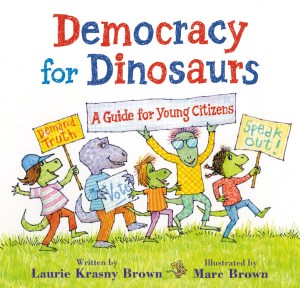Laurie Krasny Brown on DEMOCRACY FOR DINOSAURS
 Background and Rationale:
Background and Rationale:
No democracy can be taken for granted.
This is a realization I should have grasped all along. I admit that up until several years ago, democracy for me had become akin to having a friend I counted on yet rather neglected. What a mistaken and dangerous oversight that is. Dangerous because our democracy was first created as an experiment in self government- government by the people and for the people. To succeed, even to persist, democracy depends on us as citizens to materialize ideas at the core of our political system.
Our Constitution and Declaration of Rights laid the groundwork for our inalienable rights to life, liberty and the pursuit of happiness. Our history since then in many ways has been the struggle to make these principles a reality. And since we are a representative democracy, all eligible citizens are expected to choose by voting the agents who will stand in for them and lead as policy becomes law and laws get tested and enforced.
Will we Americans choose wisely when we delegate these responsibilities? James Madison worried. How can they (the voters) make wise decisions without sufficient virtue and intelligence?
Once you seriously consider this question, as I did, it seems self-evident that the education we provide to prepare children for entering this democratic community is crucial. They are our young citizens. Even being born into citizenship does nothing to ensure knowing how to exercise it intelligently. That is quite another matter. The practice of democracy must be taught and learned by each generation (as the late Justice Sandra Day O’Connor has told us).
Education is required in the performance of our most basic responsibilities, like voting in elections. It’s the very foundation of good citizenship. I worried: have we been adequately preparing children to be informed and intelligent citizens, with a solid grasp of good over evil, truth over lies, fairness over prejudice, activism over cynicism?
This is where our book comes in:
I felt compelled to write this book to recruit our youngest readers and introduce them to civic life as Americans. This is not a book that takes sides in politics. Its job is to show children what are the values that shape and give direction to our form of government, values we hope they will embrace: the freedoms we possess, the sharing with others, the fairness of judging everyone by the same rules, respect for the truth, having a voice to try and change things for the better, the meaning and satisfaction of doing something for the common good. These ideals must be acted out to become reality. Our hope is for this book to become children’s literary introduction to seeing themselves as young citizens of their community and beginning to understand what is their role.
Our approach to this subject:
With this albeit little picture book, both Marc and I put our best and most ambitious efforts to work so as to contribute to the principled education of our youngest readers. I believe that young children are perfectly capable of grasping and using behavior that for example is fair, honest and respectful of others. By identifying and modeling these ideals for them, the book sets out in each chapter to help explain what they can do to practice their citizenship. For example, in the chapter Be Fair, we first define being fair, then give familiar situations where fairness comes up, such as whether the rules in a game treat all the kid players the same, i.e., fairly. Is it that different for a country to have fair rules, called laws, that tell citizens and the government what they can and cannot do? By making such connections, we hope to meet readers at the beginning of their thinking about our country and their place in it.
Throughout the writing of this book, I also felt it was important to keep reminding readers that these are goals, that the government has not always lived up to these words in our laws. The text needed both to elucidate these principles and acknowledge that we have yet to fully achieve them. It gives momentum to our actions. Being a picture book, part of our strategy was to balance hopefully clear and accurate text with playful illustrations. We have used dinosaurs in prior books on serious subjects to good effect. They are a naturally diverse population plus they continue to fascinate many kids. The use of animals whom we can both identify with and yet keep a fictional distance from is legendary and so helpful. Why should young Americans want to participate e stand up for this kind of government? What is at stake? And how do you go about being a young citizen here? The book is an attempt to offer early answers to these questions, as we help kids notice that these values may already be familiar in their own lives. It is never too soon for them to try putting these principles into practice.
Thomas Mann wrote that democracy was not simply a political system or procedure of majority rule. For him, democracy is not just a set of rules but a way of life. It is an unending pursuit of a more perfect union. If we make this pursuit a way of life, we all stand to benefit. This is why I wrote the book.
Suggestions for its use:
Frame a discussion around the two questions:
- What do you think is wrong with our country?
- What would you do to make this a better country for everyone? What if you were the president?
Organize an election:
- Plan a conversation about the ways in which we can test whether a statement is true or false.
- What sources can we consult? This is especially crucial when it comes to assessing advertising and understanding persuasive intent.
